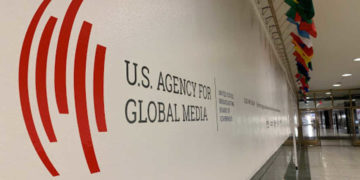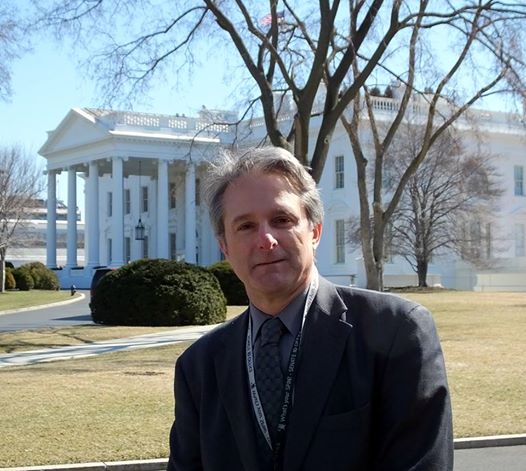By Ted Lipien for Cold War Radio Museum
At one time during the Cold War, the taxpayer-funded, U.S. government-run broadcaster, the Voice of America (VOA), helped to save the Soviet Union from the danger of ignoring the AIDS epidemic. VOA brought AIDS for the first time to the attention of ordinary Russians during Ronald Reagan’s presidency before glasnost and perestroika were introduced in the USSR. Mikhail Gorbachev was only beginning his term as the General Secretary of the Communist Party and Russia’s current leader Vladimir Putin worked as a KGB officer in East Germany.
Dr. Irene Kelner, a Soviet-born physician turned journalist who was working for the Voice of America in Washington, DC, realized in the mid-1980s that the Kremlin’s information blackout about AIDS was having a deadly effect on the population in the Soviet Union. In an effort to save lives, she started to publicize in her Russian-language broadcasts accurate scientific data about the disease’s rapid spread and offered advice on prevention of infections from HIV, the virus which causes AIDS. The Voice of America got the attention not only of ordinary Soviet citizens listening on shortwave but also through its radio programs alerted Soviet doctors and eventually some Soviet government officials to the need of changing their own information policy on AIDS. This remarkable but little known accomplishment was largely due to early and persistent efforts of Dr. Irene Kelner who at the time was the author and host of the “Medicine and Health” program broadcast weekly to the Soviet Union by VOA’s Russian Service.
The first obstacle Dr. Kelner had to overcome were not Soviet censors but her own management. She had to convince managers in charge of VOA’s Russian Service that programs on AIDS were desperately needed and could save people’s lives. She told me in March 2020 that in 1985 the senior management of VOA’s Russian Service had to be persuaded that more attention should be paid in broadcasts to the growing AIDS epidemic. Most patients who suffered from AIDS in the United States at that time were homosexual men. Homosexuality was outlawed in the USSR, carried a strong social stigma, and some VOA managers might have been afraid that the Russian Service’s reputation could suffer among its audience if its programs focused on gay men. After assuring a senior supervisor that she would use only scientific terms about homosexuality, Dr. Kelner was given permission in the summer of 1985 to produce her first report on AIDS. She stressed, however, that Russian Service chiefs, Natasha Clarkson and later Marina Oeltjen, were each highly capable managers and strong supporters of her work as the author and host of medical and other programs. I asked Marina Oeltjen, who is now retired, about Dr. Kelner and she told me that she did an outstanding job, especially through her reporting about AIDS. Dr. Kelner also found a supporter in former VOA Russian Service chief Victor Franzusoff who by the time she came to VOA was a senior writer and commentator in the USSR Division. Irene Kelner told me that she was listening to Victor Franzusoff’s programs when she was still in the Soviet Union.
I contacted Enver Safir, former VOA Russian Service broadcaster and later regional marketing director for VOA and Radio Free Europe/Radio Liberty (RFE/RL) programs in Eurasia and the Middle East, also now retired, who remembered voicing radio scripts for Dr. Kelner’s medical program. Jack Murphy one of several American-born linguists and journalists who learned Russian at American universities and were employed by VOA to work in the Russian Branch, did not participate in Dr. Kelner’s programs but knew about her medical show. He left his VOA job in 1985 and later returned to a number of managerial positions before his retirement. He mentioned that the VOA Russian Branch was quite cliquish in those days, but from what I could learn, Dr. Kelner was well-liked by the management, and got along well with both older and newer Russian immigrants, and with U.S.-born VOA broadcasters. She did not get involved in office politics as she was always busy working on her programs. Rewarded with a number of promotions, she retired from the Voice of America in 2008 from her last job as the managing editor and the head of VOA Russian radio broadcasting after a very successful career. She and her husband live now in Northern Virginia.
When I asked her about the current coverage of the coronavirus pandemic by the Kremlin-controlled media in Russia, she responded without any hesitation that it is “untruthful.” In answering my questions, she told me that the VOA Russian Service has not tried to contact her after her retirement. She said she hopes that they already focus on the heroic work of doctors treating coronavirus-infected patients (her daughter-in-law is a physician). She also mentioned the important work of nurses, virologists who developed the diagnostic tests, volunteers, and efforts of officials at federal state and local levels who try to contain the spread of the COVID-19 virus. From the beginning of the current medical crisis, she has been active on Facebook posting information about the coronavirus hotspots in Italy, Seattle and New York.
The challenges faced by media consumers today are different than during the Cold War, but propaganda and disinformation still make it difficult to distinguish between true and false information and true and false statistics, especially in news reporting and in social media posts about medical and other scientific issues. Dr. Kelner knows this better than most people as one of many former Voice of America broadcasters who earlier helped to break the monopoly on information held by officials in the Soviet Union and in other countries ruled by communist regimes. During the Cold War, media censorship and propaganda prevented millions of ordinary Soviet citizens, medical professionals and government officials from accessing true and accurate information not only on AIDS but also on almost all topics that had any chance of reflecting poorly on the Communist Party. By providing the latest medical news from the United States over many years, Dr. Kelner made a significant contribution toward AIDS education in the USSR. Her worked continued even after the information ban was weakened during glasnost and perestroika and in the period following the collapse of the Soviet Union.
READ MORE: Voice of America Doctor Who Brought AIDS Information to USSR and Saved Lives, Ted Lipien, Cold War Radio Museum, April 2, 2020.
Disclosure: Ted Lipien, a former Voice of America acting associate director, is a co-founder and supporter of BBG – USAGM WATCH.










